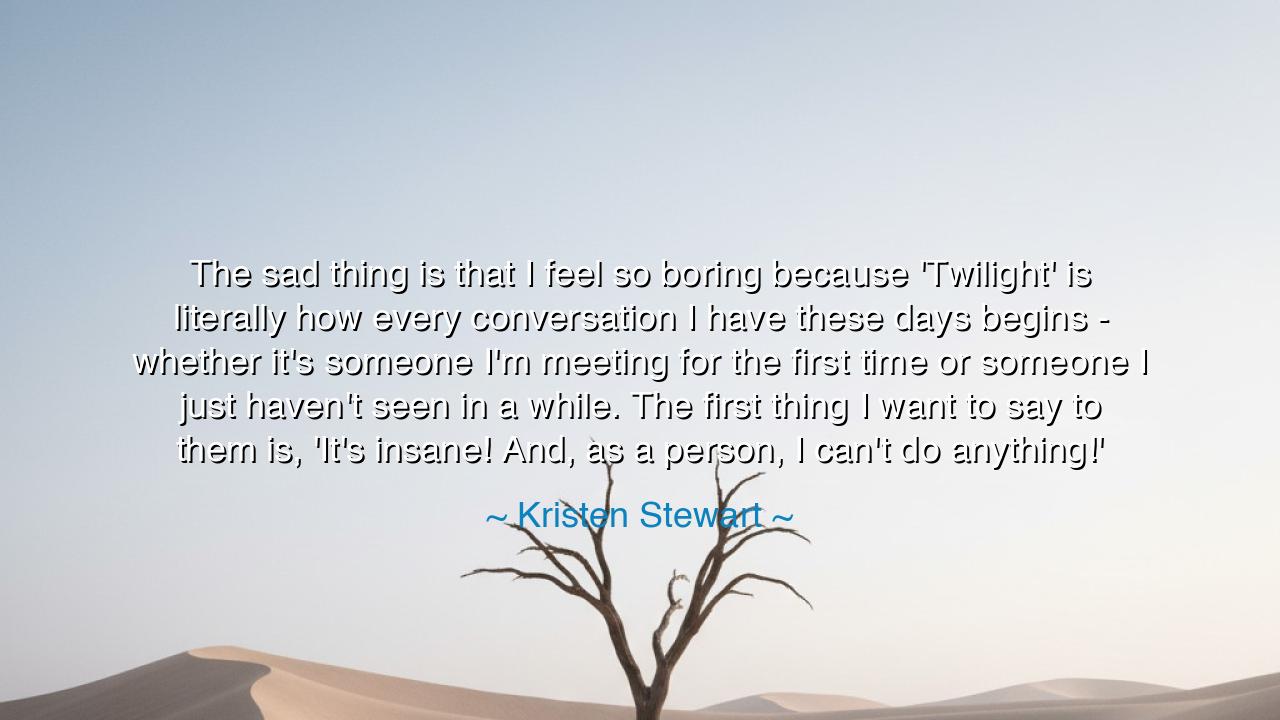
The sad thing is that I feel so boring because 'Twilight' is
The sad thing is that I feel so boring because 'Twilight' is literally how every conversation I have these days begins - whether it's someone I'm meeting for the first time or someone I just haven't seen in a while. The first thing I want to say to them is, 'It's insane! And, as a person, I can't do anything!'






Hearken, O children of tomorrow, to the lament of Kristen Stewart, who once bore the burden of fame’s unyielding chains. She spoke thus: “The sad thing is that I feel so boring because 'Twilight' is literally how every conversation I have these days begins - whether it's someone I'm meeting for the first time or someone I just haven't seen in a while. The first thing I want to say to them is, 'It's insane! And, as a person, I can't do anything!'” At first glance, it may seem a complaint of passing weariness, yet beneath her words lie truths about identity, about fame, and about the struggle to remain human when the world reduces one to a single tale.
Behold the first sorrow: I feel so boring. To be seen only through the narrow lens of a single work or single role is to be diminished, like a mighty oak reduced to one fallen leaf. The spirit cries out for wholeness, for recognition of its many colors, yet the multitude gaze only upon the shadow of a single flame. Stewart’s anguish is not the cry of vanity, but of humanity longing to be known beyond the mask that fortune has set upon her.
Next, let us ponder the weight of Twilight. What for many was a story of love and longing became, for her, a prison of repetition. To the multitudes, it was the gateway into her world; to her, it became a wall, blocking the paths to other stories she yearned to tell. Here we see the double-edged sword of recognition: the work that grants fame may also steal freedom, making every conversation an echo of the same refrain.
Hear also her exclamation: It’s insane! And, as a person, I can’t do anything! These are not idle words, but the groan of one who has been stripped of ordinary humanity. For what is freedom, if not the ability to act without being bound by the expectations of others? The ancient philosophers warned of this: the greater the crowd’s gaze, the smaller the space left for one’s true self. What she speaks is the timeless battle between image and essence, between the role society assigns and the soul’s deeper longing.
Think upon the story of Marcus Aurelius, emperor of Rome, who, despite ruling the known world, wrote in his Meditations of the burden of being seen not as a man, but as a symbol. Though adorned with crowns, he longed for the simplicity of being only himself. Just as Stewart laments that she cannot act “as a person,” Aurelius also bore the grief of being trapped within a role too vast for any one soul to hold. From this parallel we learn that both emperor and actress share the same human thirst: to be seen as whole, not as fragments.
The lesson, then, is clear: we must never reduce another to their most visible accomplishment, nor should we allow ourselves to be imprisoned by the perceptions of others. Each being is a constellation, not a single star. If we speak only of the surface, we risk denying the depths where true meaning dwells.
Therefore, let the seeker of wisdom take action. When you meet another, do not speak first of what the world already knows of them—seek instead the hidden chambers of their heart. Ask of their joys, their struggles, their unseen passions. In your own life, guard your essence from being lost to a single image; nurture your many selves, so that when one is called upon by the crowd, the others do not wither away. Thus shall you remain whole, unbroken, and truly free.






AAdministratorAdministrator
Welcome, honored guests. Please leave a comment, we will respond soon